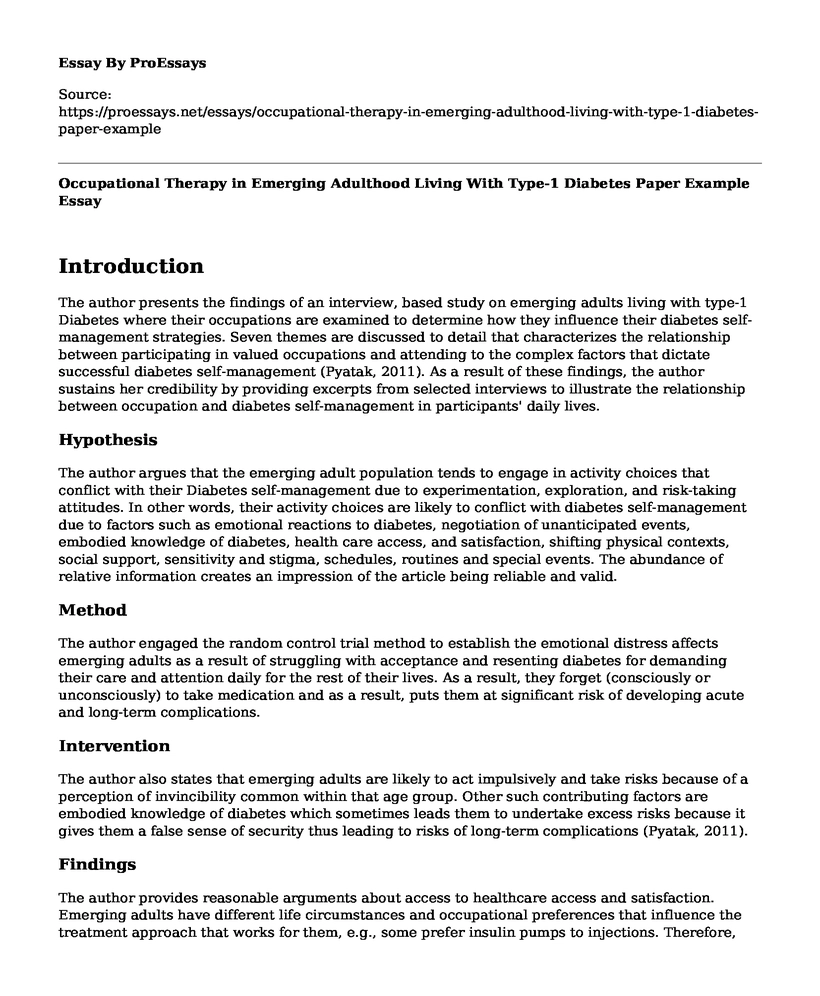Introduction
The author presents the findings of an interview, based study on emerging adults living with type-1 Diabetes where their occupations are examined to determine how they influence their diabetes self-management strategies. Seven themes are discussed to detail that characterizes the relationship between participating in valued occupations and attending to the complex factors that dictate successful diabetes self-management (Pyatak, 2011). As a result of these findings, the author sustains her credibility by providing excerpts from selected interviews to illustrate the relationship between occupation and diabetes self-management in participants' daily lives.
Hypothesis
The author argues that the emerging adult population tends to engage in activity choices that conflict with their Diabetes self-management due to experimentation, exploration, and risk-taking attitudes. In other words, their activity choices are likely to conflict with diabetes self-management due to factors such as emotional reactions to diabetes, negotiation of unanticipated events, embodied knowledge of diabetes, health care access, and satisfaction, shifting physical contexts, social support, sensitivity and stigma, schedules, routines and special events. The abundance of relative information creates an impression of the article being reliable and valid.
Method
The author engaged the random control trial method to establish the emotional distress affects emerging adults as a result of struggling with acceptance and resenting diabetes for demanding their care and attention daily for the rest of their lives. As a result, they forget (consciously or unconsciously) to take medication and as a result, puts them at significant risk of developing acute and long-term complications.
Intervention
The author also states that emerging adults are likely to act impulsively and take risks because of a perception of invincibility common within that age group. Other such contributing factors are embodied knowledge of diabetes which sometimes leads them to undertake excess risks because it gives them a false sense of security thus leading to risks of long-term complications (Pyatak, 2011).
Findings
The author provides reasonable arguments about access to healthcare access and satisfaction. Emerging adults have different life circumstances and occupational preferences that influence the treatment approach that works for them, e.g., some prefer insulin pumps to injections. Therefore, considerations as to methods of treatment may vary from individual to individual. As a result, finding developmentally appropriate health care is a major issue for people who seek medical care.
Moreover, the author states that schedules, routines, and special events greatly affect the emerging adult since activities with a consistent structure tend to facilitate the acquisition of habits that help manage diabetes, whereas those that occur inconsistently make self-management more challenging. The main strength of this argument is the fact that there is an unbiased perspective on how structured routines and schedules have assisted in maintaining a synchronized medication plan whereas lack or structure thereof leads to erratic self-medication plans (Pyatak, 2011).
Criticism/ Critical Analysis
There is a controversy that the author intentionally holds in the content related to the possibility of including other categories of diabetics not limited to type-1 only. Furthermore, the author only regarded a small pool of type-1 diabetics such that we cannot conclude definitively that the issues covered are exhausted. In summary, this article is informative and present strong findings about the influence of occupations on the health and self-management therapy of emerging adults.
Conclusion
In conclusion, the article is informative and brings to light in-depth analysis for type-1 diabetes. Therefore, this proves that the author is well informed and has carried out research thoroughly.
Bibliography
Pyatak, E. "Participation in Occupation and Diabetes Self-Management in Emerging Adulthood." The American Journal of Occupational Therapy (2011): 3-29. doc: htp: ajot.aota.aota.org.
Cite this page
Occupational Therapy in Emerging Adulthood Living With Type-1 Diabetes Paper Example. (2022, Nov 20). Retrieved from https://proessays.net/essays/occupational-therapy-in-emerging-adulthood-living-with-type-1-diabetes-paper-example
If you are the original author of this essay and no longer wish to have it published on the ProEssays website, please click below to request its removal:
- Torres and Aboriginal Strait Islander Community Child Wellbeing - Essay Sample
- Research Paper on Pain Management
- My Journey to Become a Soft-Hearted Caregiver - Essay Sample
- Assessing Pain in Older Adults: Barriers & Solutions - Essay Sample
- EHR: Benefits and Unintended Consequences on Quality Health Care - Essay Sample
- Essay Sample on The Galveston Bay Disaster: Examining Negligence & Regulations
- Paper Example on Lack of Dental Care Access for Hispanics: Barriers and Solutions







